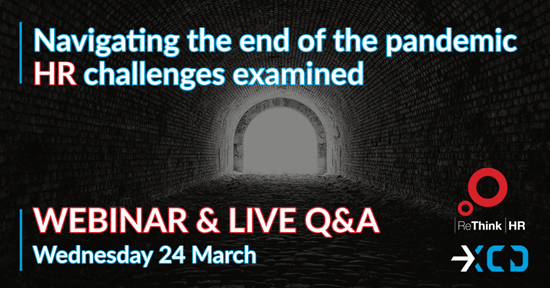End-of-pandemic challenges for HR




The thing we’ve dreamt of for months, a return towards normality, is legitimately on the cards. But the road back will not be without bumps.
A lot has changed in the last year. Although we’ve all been through the same pandemic, we have not had the same experience and HR professionals face a number of challenges as they plan reintegrating the workforce and reimagining the workplace.
We’ll be examining some of these challenges in detail in our webinar, ‘Navigating out of the pandemic’ – SIGN UP HERE
The office return
Research from McKinsey suggests that while nearly 80% of men have reported a positive home working experience, this figure falls to just 37% among their female colleagues.
Some people have enjoyed the increased flexibility and life without a commute, while many have had a far more lonely and stressful experience.
While some employees will be keen to continue working remotely, others will be itching for a return to the hustle of the office. The hybrid approach is being touted as a potential silver bullet, but like anything, it comes with its own challenges.
There are fundamental differences between home and remote working that can impact an employee’s ability to thrive and progress, so policies will need to be carefully considered to avoid creating a tiered workforce.
No jab, no job?
For whatever reason individuals choose to decline a vaccination, employer policy on how they are subsequently treated is a highly contentious issue. Some firms, particularly in the care sector, have said they will consider employees who have refused a jab as having declared themselves unavailable for work.
The legality of this is still something of a grey area. Robert Buckland, UK Justice Secretary, has suggested there is little to stop employers placing and enforcing such a clause in the contracts of new employees.
However, for existing workers, such a change to their existing employment contract is far murkier.
“Generally speaking, I’d be surprised if there were contracts of employment existing now that did make that approach lawful,” he told ITV News. “I think frankly the issue would have to be tested.”
Ethically, this is an utter minefield. If we choose to respect employees’ right to refuse a vaccine, how do we then manage the risk to an employee – a pregnant woman, for instance – for which it is medically inadvisable to have a jab?
This debate is far from over. A test case looks likely in the near future, but in the meantime, employers must tread around this issue with the utmost care.
More mobile talent
According to IBM’s Institute for Business Value, employers have performed reasonably well during the pandemic in terms of supporting their employees. In a global study of 15,000 employees, most gave their employers ‘average’ or ‘above average’ marks on support provided across physical, mental and financial wellbeing. Less than 20% rated ‘excellent’.
The same study suggested the extent to which employee expectations are shifting well beyond competitive compensation and benefits. When asked how employers should engage their employees, respondents listed work-life balance and career advancement top, with compensation and employer ethics and values coming close behind. Overall, only half of respondents gave their employers high marks on delivering what was important to them across the board.
A post-pandemic world may introduce a couple of factors that make this a problem:
- The global remote working experiment has been a broad success. As we’ve written here before, recruiters are eyeing an immediate future where the barriers of geography are significantly diminished. For talent, the same is true. A job move is no longer necessarily limited to employers within a 100-mile radius of where they live.
- The last 12 months has given us all plenty to reflect on, and there can’t be many people who haven’t used at least some of that time to really reflect on what is truly important in life and work






